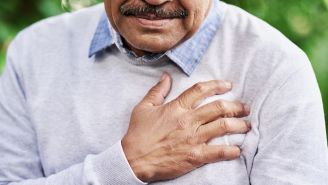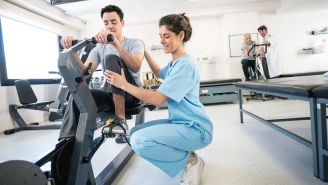6 surprising causes of heart attacks
Learn how the weather, stress, or strong emotions can affect your heart health.
Updated on March 12, 2024

Each year, about 805,000 people in the United States have a heart attack. That’s one person every 40 seconds.
You may know that smoking, lack of exercise, and an unhealthy diet high in salt and saturated fat (which is solid at room temperature), can hurt your heart. But you might be surprised to discover how some other factors—like climate change, your relationships, and even strong emotions to sports—can increase heart attack risk.
Here’s what you should know about some surprising causes of heart attacks, plus proven ways to help keep your heart strong and healthy.

Environmental Issues
Global climate change could affect your heart health. Cases of heart disease are likely to rise due to hotter temperatures and an increase in extreme weather, according to the National Institute of Environmental Health Sciences.
“Extreme hot or cold temperatures cause physical distress, which may increase the demands on the heart muscle and prevent the blood supply from doing its job, leading to a heart attack,” explains Farhad Rafii, MD, a cardiologist who specializes in treating heart conditions at West Hills Hospital and Medical Center in California.
Climate change exacerbates air quality problems, as well. For example, smoke from more frequent and devastating wildfires in the Western U.S. has been tied to an increase in heart issues, including heart attacks and heart failure. People with pre-existing heart problems are especially at risk.
Pollution also directly influences air quality—and heart health. In a large 2022 study, published in the Journal of Internal Medicine, researchers examined links between heart attacks and air pollution. They found that short- and long-term exposures to both tiny particles in the air and nitrogen oxides (poisonous gases emitted by vehicles and factories) were linked to more hospital admissions and more deaths from heart attacks.
You can help protect your heart by preparing yourself for extreme weather. That means dressing for the season, staying hydrated, and monitoring air quality before heading outside. On days with poor air quality, you may need to do less intense outdoor workouts, limit the time you spend outside, or exercise indoors. Visit AirNow.gov for the latest air quality report for your region.

Winter Chores
Researchers have noticed seasonal patterns in heart issues for decades, with more heart attacks and more heart attack-related deaths generally occurring in fall and winter. Colder temperatures, along with high winds, snow, and rain, can increase risk. Blood vessels contract when it’s cold, and tighter blood vessels means higher blood pressure. Winter can also lead to short bursts of unusually strenuous physical activity, such as trudging through the snow or shoveling snow, which can strain your heart.
For winter chores, be sure to maintain a healthy body temperature by bundling up in warm, light layers. And if you have other heart disease risks like high blood pressure or high cholesterol (a fat-like substance in the blood), or aren’t sure you’re in the right physical shape to handle the work, consider passing off strenuous snow-shoveling duties to someone else. If you do end up working outside, listen to your body and take plenty of breaks.

Divorce
Ending a marriage can take more than an emotional toll. Research has tied divorce to a higher risk of heart attacks in women. One possible reason: Stressors, particularly chronic stressors like a strained relationship, can raise your risk for heart attacks.
“One of the largest forms of stress is loss of a loved one or divorce or a major life event,” says Rafii. “Over time, the release of stress hormones can create injury to the wall of the blood vessels,” potentially causing a heart attack. If you’re experiencing stress as a result of the end of a relationship, seek out healthy ways to reduce the strain on your mind and body.

Stress, Anger, And Anxiety
Numerous studies have associated anger with heart attacks. Research has found that the risk is higher during an outburst of anger and that the risk rises with the intensity of anger. Why? Regular episodes of fury can affect blood pressure and blood vessel walls, Rafii says. Next time you feel your fists clench or your jaw tense up, he suggests counting to 10 or taking deep breaths to calm down.
There may also be reason for concern if your response to stress tends to be anxiety instead of anger. In a 2023 study published in the American Journal of Cardiology, researchers found an association between anxiety or emotional distress and heightened heart attack risk, especially among women. This supports earlier and similar research demonstrating a potential link between the two.
If anxiety is an issue for you, try to incorporate into your day calming practices like meditation and healthy habits like regular physical activity as you are able. Your healthcare provider (HCP) can recommend helpful techniques and lifestyle changes, as well as prescribe medication if needed.

Exercising Too Hard
Exercise is good for the heart. But when people who have generally been sedentary suddenly start vigorous exercise, it increases heart attack risk. Since doing too much too soon may be dangerous, talk to your HCP before starting any fitness routine.
And if you already follow a fitness routine, beware of overdoing it. Extreme athletes may push their bodies too hard, says Rafii, bringing on heart problems that otherwise wouldn’t occur. For example, a 2021 study in the European Heart Journal found that male endurance athletes over 40 tended to have more plaques (fat-like deposits inside the arteries), calcium (which contributes to plaque buildup), and thickening in their coronary arteries that bring blood to the heart, which may cause significant heart issues. While there’s no reason not to exercise, it’s—again—a wise idea to speak with an HCP about risks.

Strong Emotions About Sports
Sports fans, take note: Getting very upset over your team’s loss in the big game could affect your heart. In fact, a 2021 study in Current Problems in Cardiology found that strong emotional responses to sports were linked to higher chances of having heart issues. It was particularly true in people who already had risk factors, such as a history of heart problems, or who smoked tobacco or binge drank alcohol.
Try to remember it’s just a game. And if you have a heart condition, limit your consumption of beer, pizza, and other foods high in salt and saturated fat (which is solid at room temperature) while you cheer on your team.

Know the Signs
While chest pain is a frequent heart attack symptom, it’s not the only one. Other common symptoms include a sensation of fullness or pressure in the chest without pain, a sudden onset of difficulty breathing, and lightheadedness. You might also experience a cold sweat or pain and discomfort in the back, neck, jaw, arms, or shoulders. Some people, particularly women, may also develop nausea, vomiting, or fatigue.
If you think you’re having a heart attack, call 911 or get to the nearest emergency room. “Better to be wrong and seek immediate medical attention than to risk missing a true heart attack,” Rafii says.

Centers for Disease Control and Prevention. Heart Disease Facts. Page last reviewed May 15, 2023.
National Institute of Environmental Health Sciences. Climate Change. Page last reviewed July 21, 2023.
Hadley MB, Henderson SB, Brauer M, Vedanthan R. Protecting Cardiovascular Health From Wildfire Smoke. Circulation. 2022;146:788–801.
Wildfires may fuel heart health hazards: smoke exposure increases cardiovascular risks. American Heart Association. June 7, 2023.
Vuorio A, Budowle B, Raal F, Kovanen PT. Wildfire smoke exposure and cardiovascular disease-should statins be recommended to prevent cardiovascular events? Front Cardiovasc Med. 2023 Sep 14;10:1259162.
de Bont J, Jaganathan S, Dahlquist M, et al. Ambient air pollution and cardiovascular diseases: An umbrella review of systematic reviews and meta-analyses. J Intern Med. 2022 Jun;291(6):779-800.
United States Environmental Protection Agency. Nitrogen Oxides (NOx) Control Regulations. Page accessed September 18, 2023.
Centers for Disease Control and Prevention. Protect Yourself from Air Pollution During Physical Activity. Page last reviewed October 22, 2019.
Fares A. Winter cardiovascular diseases phenomenon. N Am J Med Sci. 2013 Apr;5(4):266-79.
Northwestern Medicine. Your Heart In Winter. November 2022.
Dupre ME, George LK, Liu G, et al. Association between divorce and risks for acute myocardial infarction. Circ Cardiovasc Qual Outcomes. 2015 May;8(3):244-51.
Zhu C, Tran PM, Leifheit EC, et al. Association of marital/partner status and patient-reported outcomes following myocardial infarction: a systematic review and meta-analysis. Eur Heart J Open. 2023 Feb 28;3(2):oead018.
Smith TW. Intimate Relationships and Coronary Heart Disease: Implications for Risk, Prevention, and Patient Management. Curr Cardiol Rep. 2022 Jun;24(6):761-774.
Kiecolt-Glaser JK, Bane C, Glaser R, Malarkey WB. Love, marriage, and divorce: newlyweds' stress hormones foreshadow relationship changes. J Consult Clin Psychol. 2003 Feb;71(1):176-88.
Mostofsky E, Maclure M, Tofler GH, et al. Relation of outbursts of anger and risk of acute myocardial infarction. Am J Cardiol. 2013 Aug 1;112(3):343-8.
Smeijers L, Mostofsky E, Tofler GH, et al. Anxiety and anger immediately prior to myocardial infarction and long-term mortality: Characteristics of high-risk patients. J Psychosom Res. 2017 Feb;93:19-27.
Wrenn KC, Mostofsky E, Tofler GH, et al. Anxiety, anger, and mortality risk among survivors of myocardial infarction. Am J Med. 2013 Dec;126(12):1107-13.
Titova OE, Baron JA, Michaëlsson K, et al. Anger frequency and risk of cardiovascular morbidity and mortality. Eur Heart J Open. 2022 Aug 6;2(4):oeac050.
Chan B, Buckley T, Tofler GH. Emotional Stress and Physical Exertion as Triggers of Acute Myocardial Infarction. Am J Cardiol. 2023 Sep 15;203:285-287.
Wen Y, Yang Y, Shen J, et al. Anxiety and prognosis of patients with myocardial infarction: A meta-analysis. Clin Cardiol. 2021 Jun;44(6):761-770.
Selvi Y, Aydin A, Gumrukcuoglu HA, et al. Dream anxiety is an emotional trigger for acute myocardial infarction. Psychosomatics. 2011 Nov-Dec;52(6):544-9.
Merschel, Michael. “‘And Just Like That,’ everyone wondered: Is exercise safe?” American Heart Association. December 15, 2021.
Centers for Disease Control and Prevention. High Blood Pressure Symptoms and Causes. Page last reviewed May 18, 2021.
Parry-Williams G, Gati S, Sharma S. The heart of the ageing endurance athlete: the role of chronic coronary stress. Eur Heart J. 2021 Jul 21;42(28):2737-2744.
Maturana MA, Glover EA, Raja J, et al. Are Die-Hard Football or Other Sports Fans at Risk of Cardiovascular Events? Curr Probl Cardiol. 2021 Mar;46(3):100743.
Centers for Disease Control and Prevention. Heart Attack Symptoms, Risk, and Recovery. Page last reviewed July 12, 2022.
More On


video

article

slideshow


video


video
